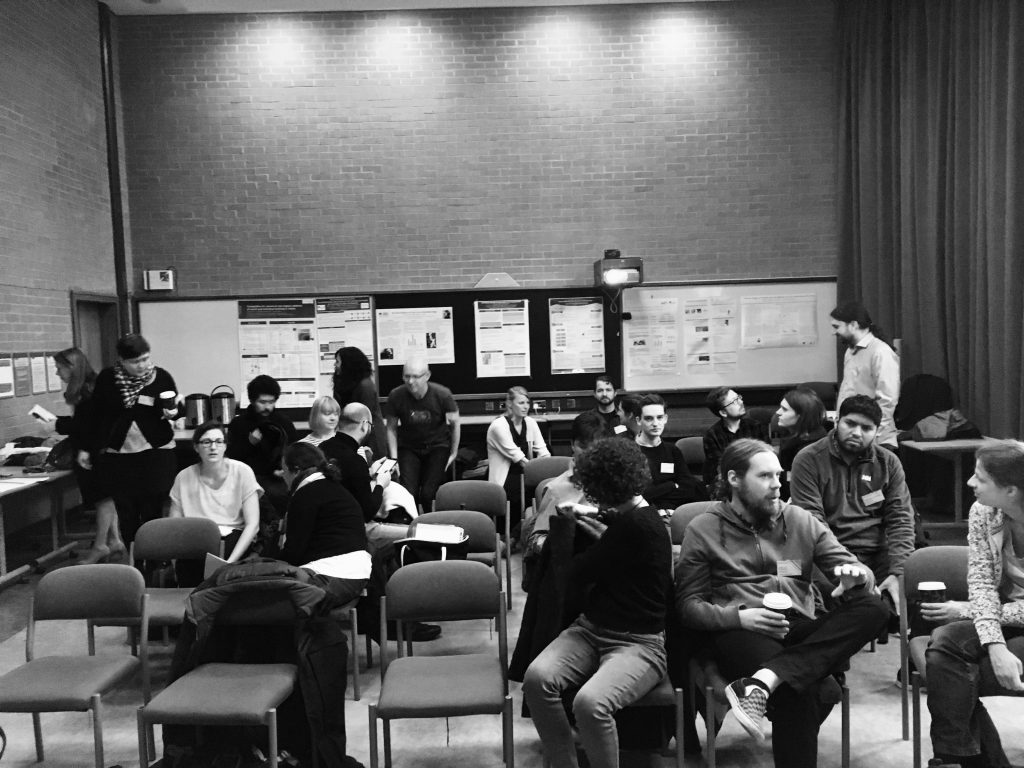Winter Workshop 2017
The workshop was built around three activities, that should help with breaking the ice and getting to know each other. In the following two activities we exchanged ideas and visions about our research field and explored ways for public outreach. The discussions were lively, and only because of the tight time schedule we had for the day I had to end some very interesting discussions that undoubtedly could have gone longer.
Aside from the activities, we had thirteen poster presentations on a wide variety of topics, reaching from modelling to studies with humans, and from tool-use to teaching in birds (see poster list below).
Finally, our two keynote speakers opened and closed the day with very insightful talks. Olli Loukola began by introducing the definitions of sociality, social learning, and culture. He then talked about the bumblebee work he has done at Queen Mary University in London. Together with his colleagues of the Chittka Lab, he found the fundamental mechanisms necessary for culture (social learning, bias for social cues, etc.) to be present in the social living bumblebee (Bombus terrestris). This poses some important questions, such as, if social learning is widespread and even present in small-brained insects, what is necessary to move on from social learning to forms of culture? Also, how much can we learn from insects about our own evolution of culture? This was a thought-provoking opening for our workshop.

Later on, our second keynote speaker Eva Reindl talked about her PhD work in Claudio Tennie’s Lab at Birmingham University and what we have learned about social learning and cultural evolution in humans based on studies with children, but also non-human animals. She also talked about how the formation of traditions and culture differs in humans and non-human animals, and where possible parallels lie? Also, how does research in different scientific fields help us better understand the phenomenon cultural evolution?

The day ended with a collective visit at a nearby pub where discussions in bigger and smaller groups continued until most had left to their hotels or trains to get them back home again. It was undeniably an intense day. I hope you enjoyed the variety of scientific backgrounds as much as I did, and that the discussions we had today will give you much to think about.

I want to express my deepest gratitude to everyone who helped organise this day. Especially, Edith Invernizzi who helped a lot with organising the event. But also to each participant for coming all the way to Manchester, and engaging in intense discussions. You all made this day a success and I couldn’t be happier.
I feel proud and honoured having hosted you here in Manchester. Hopefully, this is just the first of many future meetings to come. Thank you all and have a safe journey home.

Till we meet again!
Posters:
- Modelling language change triggered by language shift (Anna Jon-And)
- Task difficulty and uncertainty affect social information use in foraging bumblebees (Baracchi, Vasas, Jamshed Iqbal, Alem)
- Humans show concern for others, even non-kin (Emily Messer)
- Do instructions squash creativity? (Zarja Mursic)
- History of Globalization and big data from the free port of Trieste (1850-1914) (Gaetano Dato)
- The evolution and development of reflective imagination, and its role in behavioural adaptation (Alejandra Wah)
- Why individuals learn socially, when and from whom (Marco Smolla)
- Tool use in domestic dogs (Canis familiaris) (Hannah Kate Worsley)
- Zone of Latent Solutions hypothesis – which behaviours great apes are able to reinvent, without social learning (Damien Neadle)
- Cultural changes of baetican olive oil amphorae from an evolutionary perspective (Maria Coto-Sarmiento)
- The study of interactions between cultural mechanisms and economic dynamics through an evolutionary perspective (Simon Carrignon)
- Teaching behaviour in birds and primates (Camille Troisi)
- The cultural evolution of vaccine-related narratives and its influence in vaccine decisions (Angel v. Jimenez)
Thanks to our sponsors:
We are grateful for the support from the Company of Biologists and the Faculty of Science and Engineering at the University of Manchester, especially Michael Turner.
About the author
Post-doctoral Fellow at UPenn
